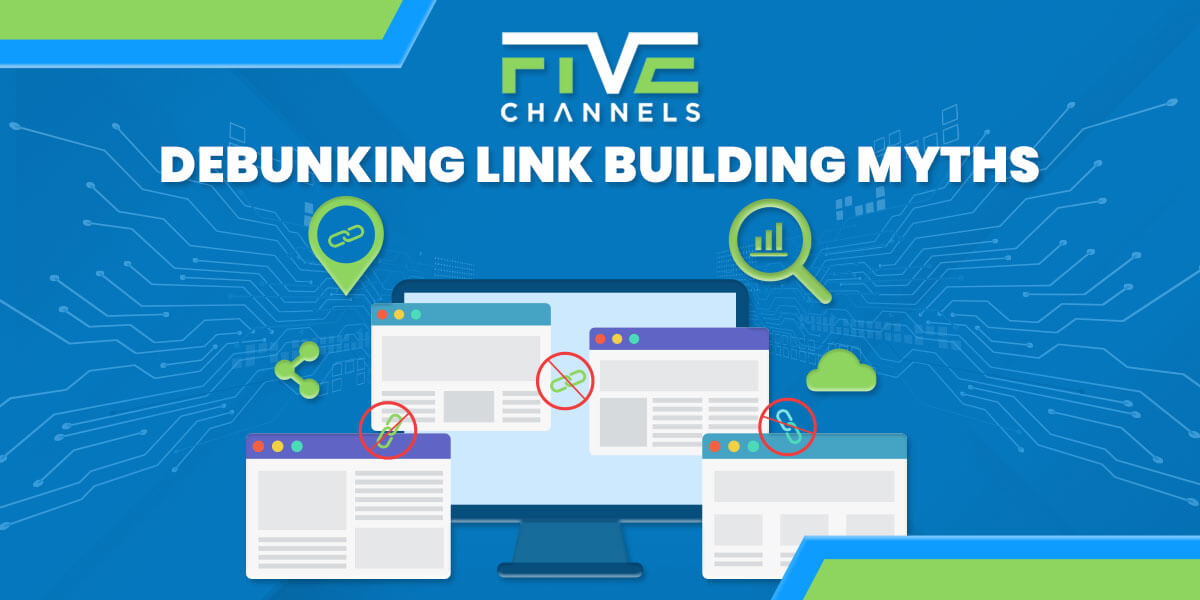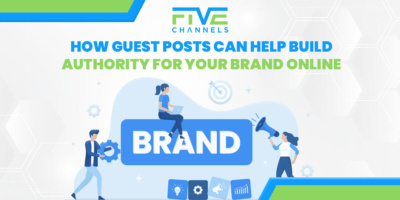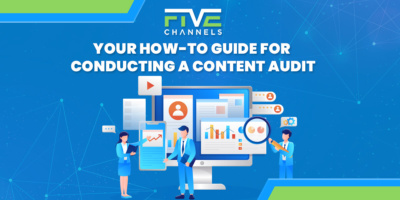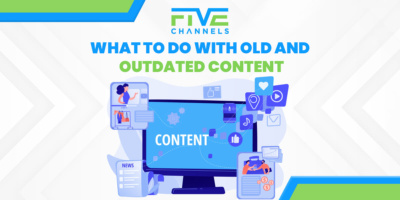Backlinks are one of Google’s top ranking factors. Without quality links, your search engine rankings might not improve. As a result, linking-building is an important component of any search engine optimization (SEO) strategy.
In fact, the more backlinks a page has, the more organic traffic you’ll start to generate. Unfortunately, 66% of pages don’t have backlinks, possibly because there are so many incorrect myths about link-building strategies that do not help anyone.
If you want your link building strategy to being to provide actual results for your business, let’s begin by debunking the top myths that could slow you down.

Myth #1: There’s Only One Type of Link
One of the biggest myths that can impact your link-building progress is that there’s only one type of link. As part of your link-building strategy, you need to diversify.
In case you’re unaware, backlinks are links on other websites that link back to your content. Each backlink is considered a vote of confidence in your post. As you generate more backlinks, Google will recognize people love and trust your content.
More backlinks for a page or post could help the content rank higher on search engine result pages (SERPs). Higher rankings can help you:
- Generate brand awareness and recognition
- Generate more website traffic
- Rank ahead of competitors
- Boost brand trust and loyalty
- Increase leads, sales, and your ROI
- Position yourself as an industry thought leader
However, Gaining more links isn’t always better. Instead, you need to focus on links that will boost your domain authority (DA).
Your DA isn’t a direct ranking factor. Developed by Moz, your DA indicates how likely your content is to rank on SERPs. A higher score (closer to 100) indicates a high likelihood.
Most marketing experts focus on generating backlinks from websites that already have a high DA. These sites are more likely to boost your DA, leading to higher search rankings.
However, you need to diversify your links to increase your likelihood of better rankings on SERPs.
For example, you’ll need links that feature your target keyword within the anchor text. Anchor text is the text on a post that contains a link. When readers click on the text, they’ll get directed to your website.
Anchor text that’s keyword-rich can further benefit your rankings.
You also need to generate links from sites that are relevant to your niche.
Otherwise, consider “doFollow” versus “noFollow” links and links from sites that aren’t already linking to yours. We’ll review these types of links in more detail.
Most importantly, don’t focus on any singular type of link when strategizing.
Myth #2: You Don’t Need Your Google Listing
Your Google Business listing takes up prominent space on the right corner of relevant searches. Taking up real estate on SERPs can help more people find your brand online. As more people learn about your business, they might feel more inclined to trust your brand.
They might also decide to visit your website, which could help you generate backlinks in the future.
Your Google Business listing will display your:
- Business name
- Address/directions
- Phone number
- Business hours
- Business category
- Photos/videos
- Posts
- Customer reviews
It also displays your website.
If you want to generate more backlinks, you need to make sure your site is easy to find. Make sure to claim your business on other online directories as well. These can include:
- Zomato
- Yellow Pages
- Yelp
- Trip Advisor
- Bing Places
- Merchant Circle
- Yahoo Local
It’s important to note that these links are “noFollow.” Don’t forget you’ll want to diversify your strategy. Claiming your business on these directories will increase your online presence as well.
Myth #3: Your Content Quality Won’t Help
Companies that feature a blog generate 97% more links to their websites than those that don’t. Companies that blog have 434% more indexed pages than their competitors. Your content strategy can have a major impact on your link-building efforts.
Creating unique, informative, high-quality posts can encourage other blogs to create backlinks to your content. You won’t have to worry about your outreach strategy to generate these links. Instead, you can rely on natural links to improve your domain authority.
When creating content for your blog, take the time to:
- Gather audience research
- Align your content with the user’s search intent
- Focus on longtail keywords
- Optimize your content correctly
- Optimize your images with the target keyword
- Diversify your content
- Promote your content
Consider working with an experienced digital marketing agency this year. They can help develop your entire content, SEO, and link-building strategy. With their help, you can create high-quality content for your target audience.
Otherwise, make sure to focus on EAT within your posts. EAT stands for expertise, authority, and trustworthiness. Establishing EAT within your content could boost your brand’s credibility and help foster brand trust.
Establishing EAT by leveraging your experience and expertise can help your content stand out. Other blogs might feel more inclined to trust your business as a result.
Meanwhile, consumers will begin to recognize they can trust your brand. They might decide to convert into a lead or sale after reading your blog content. They might decide to explore other pages on your site too.
As they explore, their dwell times will improve, which can boost your rankings.
Improving your rankings can help other readers find you online, which could lead to more natural backlinks.
Make sure to ignore these content marketing myths while you’re at it.
Myth #4: You Can’t Build Links into Product/Category Pages
As you discover myths about link-building strategies, you might hear that it’s impossible to build links into product and category pages. It’s not true! In fact, building direct links into these pages can have major benefits from a search visibility perspective.
Remember, creating high-quality content can increase your likelihood of generating natural backlinks. If you want to generate links for your product and category pages, focus on quality.
Make sure you’re providing readers, consumers, and other bloggers with unique insights and information they can’t find elsewhere. Otherwise, you might not give them a good enough reason to link to these pages.
Why might journalists or other bloggers want to link to a company’s product and category pages?
They might recognize you’ve provided insights or content that isn’t self-promotional or self-serving. Journalists want to find content that will benefit their readers. If you create content they can’t find elsewhere could help you gain a link.
You can use these links to benefit your business as well.
For example, you might create a pop-up for a product page that offers a 15% off coupon to readers. Instead of self-promotional content, you’re offering them something beneficial.
Myth #5: Only Pitch to Journalists in the Morning
You can start generating quality links from professional publications by sending a pitch email to a journalist. Some marketers think they should only send emails in the morning, though. This myth is false and could impact your link-building efforts.
Every journalist is different. Some might check their emails and review pitches in the morning. Some might prefer to check at the end of the day.
Either way, don’t make assumptions.
Instead, make a list of 10 to 15 people you want to start reaching out to. Then, start developing a strong, compelling pitch. Within the pitch, highlight the value you’re offering the journalist or their readers.
If you’re struggling to send pitches, consider working with an experienced digital marketing agency. Some agencies already have strong relationships with journalists who rely on pitches. You can leverage these relationships to improve your link-building strategy.
Myth #6: News Sites Only Offer noFollow Links
Many marketers also believe that top-tier news sites now only offer “noFollow” links. However, this link-building myth is completely false.
Generally, “noFollow” links don’t count toward the ranking algorithm. These links can include press releases, paid ads, and blog comments.
Generating backlinks from well-known publications and news sites can still boost your rankings.
Try reaching out to different journalists, bloggers, writers, and publications. Create a strong, compelling pitch email and ask them to reference your content. When their audience discovers the post, they’ll find the link to your website.
Then, you can start generating referral traffic from the publication, which can benefit your rankings.
It’s also important to note that a publication might have different policies per desk (business, travel, news, etc.). So, while one area might offer a “noFollow,” the other might offer a “doFollow” link instead.
Myth #7: Relevancy is Irrelevant
When generating backlinks, relevancy is key. Make sure to find publications and sites that already reach your target audience. Focus on sites that suit your niche.
Otherwise, journalists might not see a reason to share your content within their publications.
Journalists want to choose content their readers will want to read. If your content or niche isn’t relevant to their audience, they’ll move on.
Relevancy can also impact Google’s preference as it reviews your content. Google will look for backlinks that are relevant to the topics you cover. If the link is irrelevant, it might not boost your search engine rankings.
Finding highly relevant, quality links that point to your domain can boost your search rankings and visibility.
Myth #8: You Can’t Request Links
Over 40% of marketers say link building is the most difficult part of search optimization. In fact, 94% of the world’s content never generates links. Meanwhile, less than 2.2% of content generates links from multiple websites.
Don’t believe the myth that you can’t request links, though. Instead, take the time to develop an outreach program.
You can always ask a journalist, writer, or webmaster if they’re willing to add a link to your content within their post. Make sure your links are relevant to their audience and niche, though. Otherwise, they might not feel inclined to help.
Don’t ask in a demanding way, either. Instead, draft a polite, brief message asking if they’re willing to provide a backlink.
Pay attention to websites that start referencing your brand by name too. Did they add a link to your website within the post? If not, ask them to!
Chances are, they’ll feel willing to create the link if they’ve already referenced your brand.
Remember, you don’t have to build your outreach strategy alone. Instead, consider working with an agency to start building quality links.
Myth #9: The Anchor Text Doesn’t Matter
Remember, the anchor text contains the link to your website. If you receive a link that features generic text, reach out to the webmaster. Ask if they’re willing to chance to anchor text.
Make sure the anchor text you recommend is relevant to your content.
For example, maybe a blog linked to your blog post about SEO marketing strategies. You can ask them to use “SEO marketing strategies” or “SEO tips” as the anchor text.
Myth 10#: All Guest Posts Help
You can create guest posts for other websites to generate quality links. However, not all guest blog opportunities will benefit your link-building strategy.
Before jumping on an opportunity, audit the website. Do they speak to your ideal customers? Does the site have a high DA?
As always, choose websites that are relevant to your niche.
Myth #11: Internal Links Aren’t Helpful
Internal links send readers to other pages on your site. These links are important. For starters, Google’s bots will have an easier time crawling and indexing your content.
Internal links will also encourage readers to explore your site. As they learn more about your business, they might convert into a lead or sale.
Myth #12: Reciprocal Links Can Help
These links occur when you create a backlink for a site that’s already linked to your content.
Over 40% of the top-ranking pages have some reciprocal links. Too many reciprocal links, however, could earn you a penalty from Google.
Make sure you’re diversifying your links.
Ignore These Myths About Link Building Strategies
Believing these myths about link-building strategies could impact your search engine optimization strategy. Instead, reevaluate your current strategy to find new ways to generate quality backlinks. You can also start working with an SEO expert to find new ways to boost your rankings.
With higher rankings, you can reach more clients to boost leads, sales, and your ROI.
Need help improving your link-building strategy? We’re happy to lend a hand.
Request your free digital marketing review today to get started.
Owner and Chief Marketing Officer, Jason Hall, and his team specialize in creating brand awareness / traffic and lead generation / marketing funnel and conversion optimization, while utilizing the appropriate marketing channels available within your industry. With diverse clients throughout the world, Jason's team is well connected within many industries to assist with your marketing strategies. With no long term contracts and various levels of service, Jason's team will increase the quality of your online traffic, leads, and sales.
About the author...
Located in the heart of the Emerald Coast - Destin, FL, founder and Chief Marketing Officer, Jason Hall, and his team specialize in creating brand awareness / traffic and lead generation / marketing funnel and conversion optimization / and PR campaigns, while utilizing the appropriate marketing channels available within your industry.
With diverse clients throughout the world, Jason's team is well connected within many industries to assist with your marketing strategies. With no long term contracts and various levels of service, Jason's team will increase the quality of your online traffic, leads, and sales.









